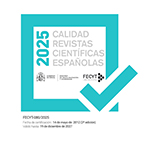Quality of life and urban scale according to regions in the Argentine Republic (2010)
Abstract
The conceptual vagueness of the concept of quality of life allows different theoretical approaches for its study. However, it lacks sufficient work that concentrates on studying the variability of the quality of life in the territory. In this context is where the geographical science with its tools can make a concrete contribution. Consequently, in this work an index is applied that contemplates socioeconomic and environmental variables at an urban scale to perform a comparative analysis according to the regions of the Republic of Argentina. In conclusion, it is recognized that medium-sized cities register the most satisfactory values for the said index, particularly those with between 400,000 and one million inhabitants.
Downloads
Article download
License
In order to support the global exchange of knowledge, the journal Anales de Geografía de la Universidad Complutense is allowing unrestricted access to its content as from its publication in this electronic edition, and as such it is an open-access journal. The originals published in this journal are the property of the Complutense University of Madrid and any reproduction thereof in full or in part must cite the source. All content is distributed under a Creative Commons Attribution 4.0 use and distribution licence (CC BY 4.0). This circumstance must be expressly stated in these terms where necessary. You can view the summary and the complete legal text of the licence.












